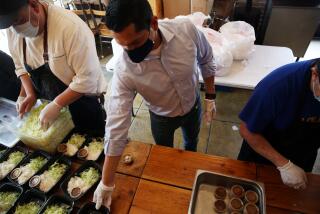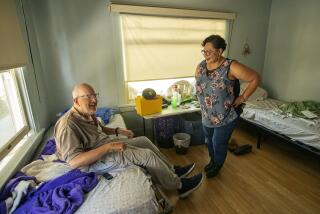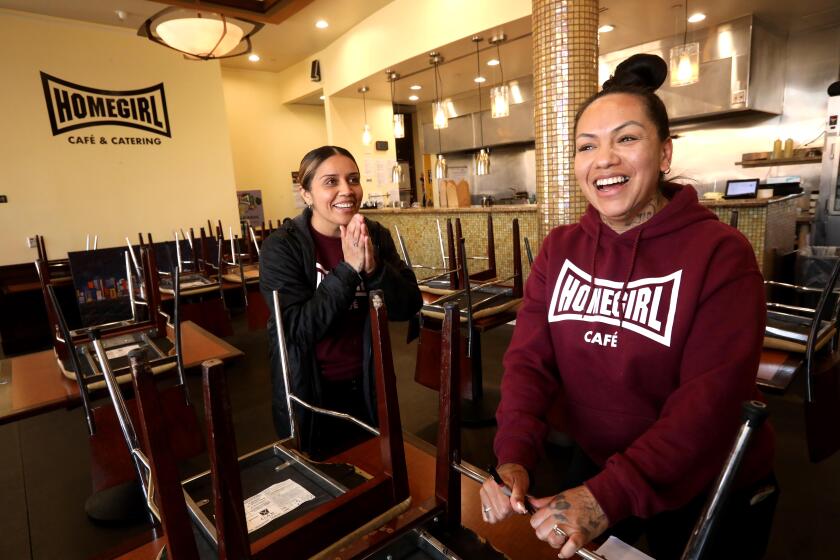Meal Programs Say Money Drying Up
Nonprofit organizations that provide thousands of homebound seniors with what is often their only meal of the day say they are running out of money to keep the food coming.
Social service agency officials in Los Angeles and Orange counties say they may have to limit the number of elderly people they serve if federal funding fails to keep pace with the demand for home-delivered meals.
Federal officials have relied on 1990 U.S. Census Bureau data in making funding decisions for home-delivered meals programs. But those figures do not accurately reflect the number of needy seniors, providers say.
Once the 2000 census figures are approved, the funding gap should begin to close, advocates for the elderly say. But until additional federal funds are available, home-delivered meals providers will struggle to make ends meet.
For example, the San Fernando Valley Interfaith Council, a nonprofit social service agency that contracts with the city of Los Angeles to provide 700 meals a day, is trying to get the most out of each dollar.
The agency does not rely solely on federal funds funneled to city and county governments, but has developed annual fund-raisers that help to provide a financial cushion.
If the agency relied only on federal funds, officials said, there would not be enough food to go around.
The Interfaith Council received $403,000 in federal funding to run its program for a year. Of that, the monthly allotment of $33,358 was enough to cover 8,000 meals. However, the agency served 15,900 meals in December.
“That’s why we need so much more money for the program,” said Irma Nielsen, the agency’s controller.
Marilyn Fried, executive director of ONE, the Organization for the Needs of the Elderly, which provides home-delivered meals from its center in Van Nuys, said longer life-expectancy rates should be taken into consideration when social service agencies draft budgets for home-delivered meals programs.
Anticipating an increase in the city’s elderly population, Los Angeles Department of Aging officials provided an additional $500,000 to its home-delivered meals program this year.
Even so, funding fell far short of projections, and the department already has overspent its budget by $300,000, said Ann Smith, the department’s general manager.
Tom Camarillo of North Hollywood sees the need firsthand as he makes his rounds of homebound seniors every weekday from the Interfaith Council’s senior center in North Hollywood.
“Some of the people are so happy to see you because, for some of them, this is their only meal,” said the retired GM mechanic who has delivered meals for 17 years.
On a recent morning, Camarillo’s first stop was at a trailer park off Lankershim Boulevard in North Hollywood. There, he opened the back of the station wagon and picked up a single-serving container of sesame chicken, salad, pudding and milk.
Wanda Heflin, 66, dressed in a bathrobe and slippers, stood in the doorway of her tiny trailer and greeted Camarillo with a broad smile.
“I’m on a limited income and this really helps,” Heflin said. “It’s wonderful.”
While Camarillo delivered food in the San Fernando Valley, paid drivers with the International Institute of Los Angeles brought meals to seniors in Boyle Heights.
The nonprofit agency contracts with the city to provide 270 meals a day, said Estella Mojica, nutrition project director for the agency’s Senior Services Division.
Like the other agencies in the meal-delivery network, the institute is trying to meet a growing need with limited funding.
“The inadequate money not only affects the number of clients that we serve, but the paid drivers,” she said. “In this area, there are not many people who can afford to volunteer. They have to get paid.”
A recent allocation from the city, she said, has helped the agency pay its drivers and begin to pare down a 100-person waiting list.
In Orange County, federal funding for the elderly meals programs has remained the same since 1990, while costs and demand have sharply risen, providers say.
In 1993, $1.2 million in federal funding was allocated for meals at senior centers and home-delivered meals.
While total funding has increased 25% from 1993 to 2000, the providers served 43% more meals, or 1.8 million in the 2000 fiscal year.
This month, the directors of the three Orange County programs will meet with supervisors and county officials to discuss their funding crisis.
The agency officials’ concerns include rundown trucks and offices, employee turnover and imaginative ways to plan meals with food that, in most cases, must cost less than $1.30 per meal.
Orange County officials say the nonprofit organizations--South County Senior Services, Feedback Foundation and Senior Meals and Services--have not provided enough data to support their bid for $250,000 each, but they want to make sure the seniors get their meals.
More to Read
Start your day right
Sign up for Essential California for news, features and recommendations from the L.A. Times and beyond in your inbox six days a week.
You may occasionally receive promotional content from the Los Angeles Times.






